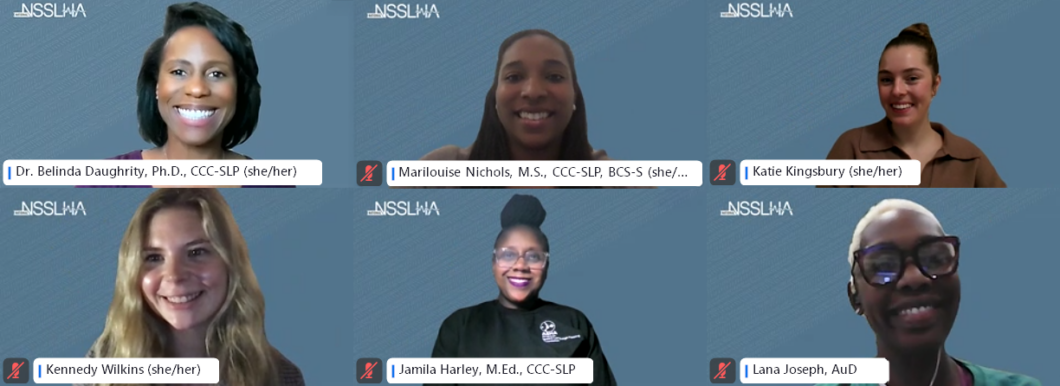Fresh starts, whether it is in grad school or a clinical fellowship or externship in Audiology or Speech-Language Pathology (SLP), can be both exciting and overwhelming. During a recent webinar, panelists shared invaluable advice for students looking to build their resumes and gain relevant experience in the field. Whether you’re still early in your academic career, preparing to apply for graduate programs, or about to take the next step in your career through a clinical fellowship or externship, here are the key takeaways from the discussion.
You can watch the full discussion here:
What Professionals Look for in a Resume/CV
When reviewing resumes and CVs, hiring professionals and admissions panels are looking for clear, concise, and relevant information that demonstrates your qualifications. Key elements to include are:
- Clinical Experience: Focus on any volunteer or shadowing roles where you’ve worked directly with patients or assisted in therapy sessions.
- Skills: Highlight both your hard and soft skills (including any additional languages you speak!). In SLP, clinical competencies are important, but so are communication and interpersonal skills.
- Relevant Coursework: If you’re early in your studies and don’t have extensive hands-on experience yet, include relevant courses that showcase your foundational knowledge.
Programs and employers want to see that you have a solid understanding of the field and that you’ve been proactive in gaining experience, even if you’re still in school. Tailor your resume to reflect the skills and experiences most relevant to the position or program you’re applying for.
For additional tips on how to write your resume, ASHA’s resume writing strategies page is a great resource.
2. Resume Length
A common question is: “How long should my resume be?” The experts agree that your resume should be as long as it needs to be to accurately represent your qualifications, but it should not be overly detailed. Here are some guidelines:
- Undergraduate Students: If you’re still in school, a one-page resume is usually sufficient. Focus on quality over quantity by highlighting the most impactful experiences.
- Graduate Students or Early Career Professionals: As you gain more experience, your resume may expand to two pages. This is especially true if you have research projects, multiple internships, or relevant work experience to showcase.
Remember, the goal is to present your skills, experience, and qualifications in a clear and concise manner. If you have more information to include, ensure it’s relevant to the position and doesn’t overwhelm the reader with unnecessary details.
For more tips on how to understand what employers are looking for, check out ASHA’s guide to decoding job descriptions.
3. Tailoring Your Resume for Different Job Opportunities
One of the most valuable pieces of advice shared during the webinar was the importance of tailoring your resume for different job opportunities. Every job is different, and so is every employer’s ideal candidate. Here’s how you can adjust your resume:
- Targeted Versions: Customize your resume to highlight experiences and skills that match the specific job or graduate program requirements. For example, if you’re applying for a clinical role, emphasize your direct patient care experience. If you’re applying for a research-based position, focus on your research projects or analytical skills.
- Keywords and Phrasing: Many employers use Applicant Tracking Systems (ATS) that scan resumes for specific keywords. Ensure your resume includes terms and skills mentioned in the job description to improve your chances of passing through the ATS.
Tailoring your resume not only shows that you’ve done your research but also that you are genuinely interested in the position. For further insights on how to adjust your resume for different roles, check out ASHA’s Job Seeker Toolkit.
4. What to Highlight and Prioritize on Your Resume
When you’re deciding what to emphasize on your resume, consider what will be most valuable to the hiring manager or admissions committee. Here’s a quick breakdown of what to prioritize:
- Relevant Experience: Whether it’s clinical experience, internships, or volunteer roles, make sure your relevant work stands out. Highlight how your experiences contribute to the skills needed for the position or program.
- Education and Certifications: If you’ve taken specialized courses or obtained certifications, be sure to include them. This is particularly important for graduate school applications, where academic credentials are key.
- Soft Skills and Professionalism: In addition to technical skills, employers look for individuals who can communicate effectively, work in teams, and demonstrate professionalism. Be sure to highlight your ability to collaborate and solve problems.
A well-rounded resume not only showcases your qualifications but also demonstrates your fit for the role and your professional attitude.
For examples on how to structure your resume and highlight the most important elements, NSSLHA’s blog on building a resume that tells your story is an excellent guide.
5. Resume Writing Is an Ongoing Process
Creating a strong resume is not a one-time task. As you gain more experience, take time to update your resume regularly. Each new position, volunteer opportunity, or course you complete can add value to your resume. Make sure to revisit it as your career progresses, tailoring it for each new opportunity.
Also, remember that resume writing is an ongoing learning process. Take the time to seek feedback from mentors, professors, or colleagues who can offer constructive criticism and help you refine your approach.
If you’re looking for more resources on job applications and career development, explore ASHA’s career development resources.
Building a career in SLP and Audiology requires a strategic approach, and your resume is often the first impression you make on potential employers or graduate schools. By following these expert tips on what to highlight, tailoring your resume for each opportunity, and prioritizing relevant experiences, you’ll be well on your way to landing the role you desire.

